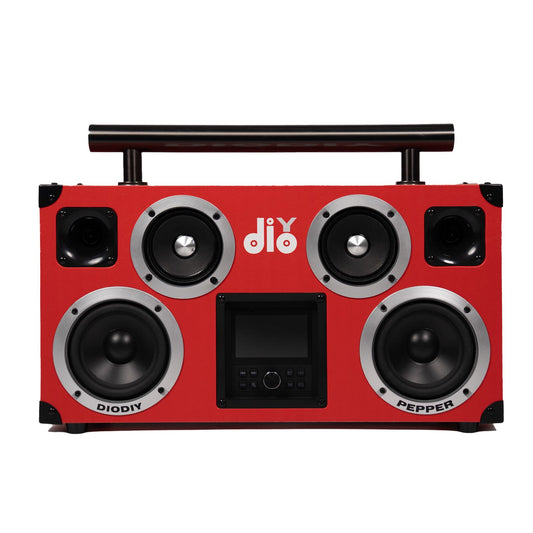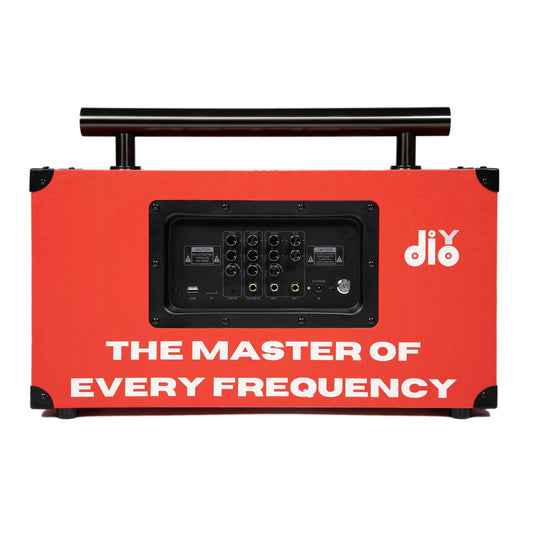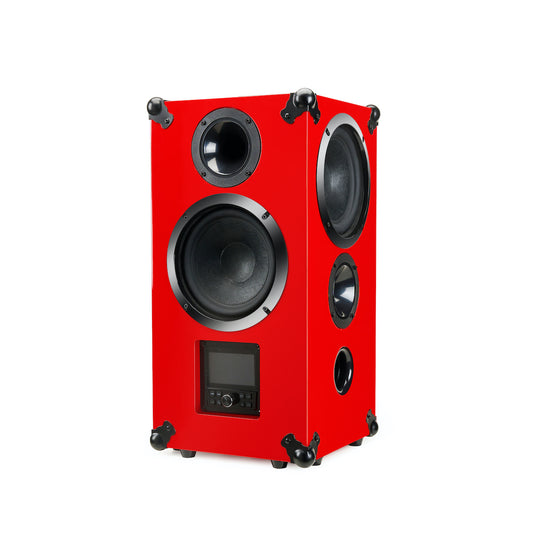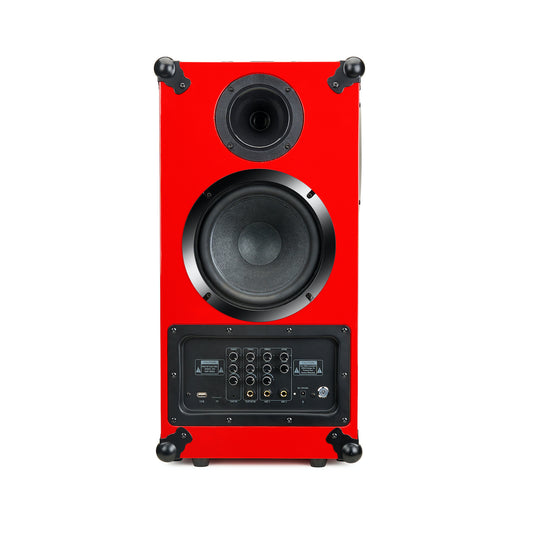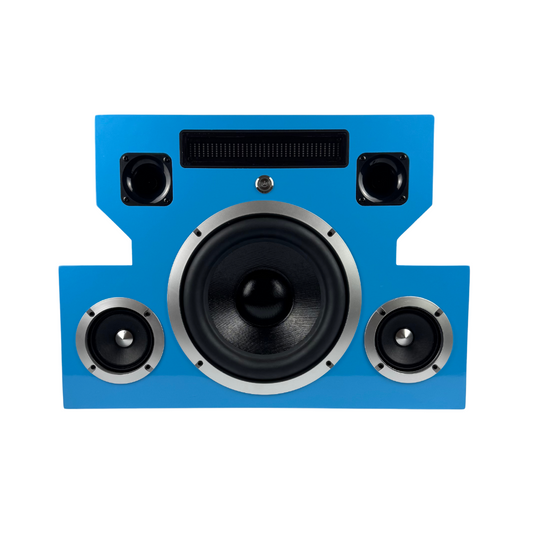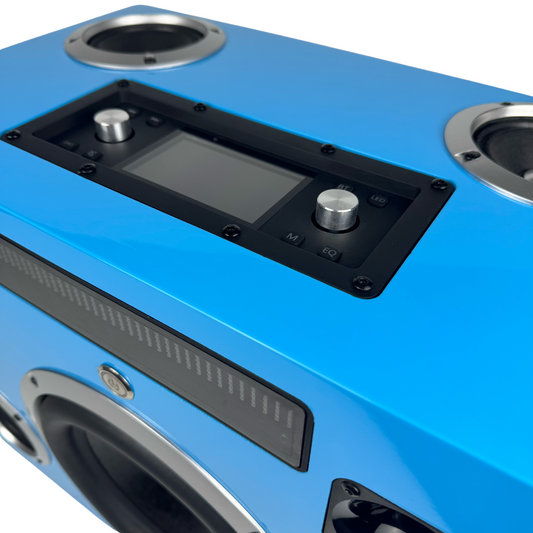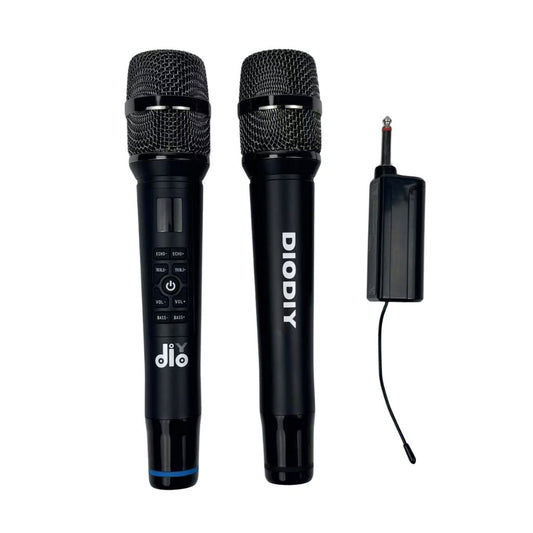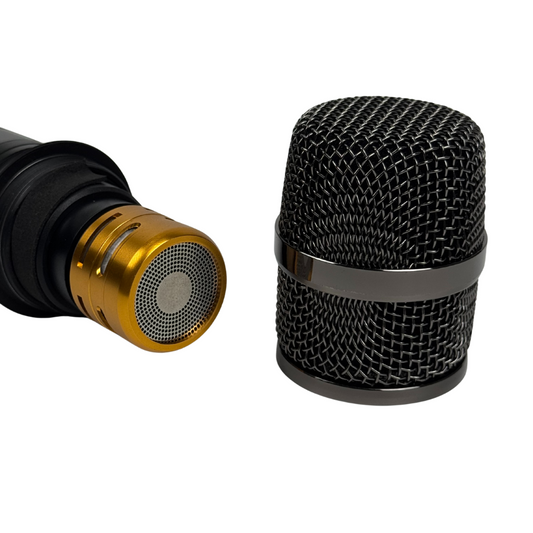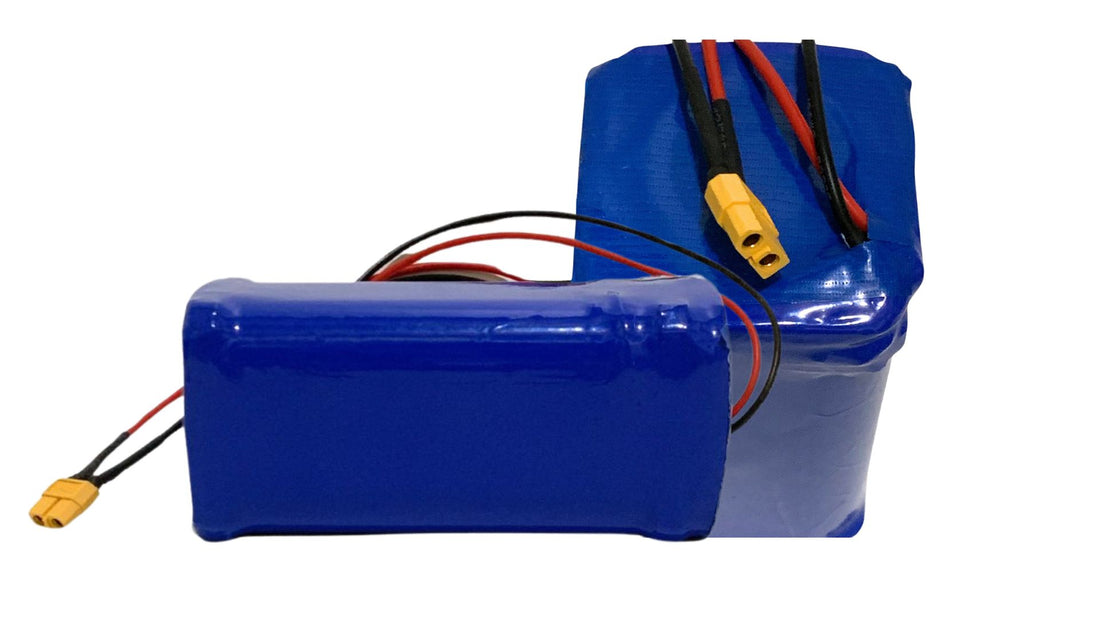
Why Choose Lithium Iron Phosphate Batteries for Custom Speakers?
Share
When designing custom speakers, the type of battery you choose can significantly impact the performance, safety, and longevity of your system. Lithium Iron Phosphate (LiFePO4) batteries have gained recognition as a superior option, particularly for audio equipment. In this blog, we will explore what lithium iron phosphate batteries are, compare them to lithium-ion batteries, and explain why LiFePO4 batteries are a better choice for custom speaker projects. We will also discuss why lithium-ion batteries are still prevalent in most speaker systems today.
What Is a Lithium Iron Phosphate Battery?
Lithium Iron Phosphate (LiFePO4) batteries are a type of rechargeable battery that differs from standard lithium-ion batteries in their chemistry. The key distinction is the material used in the cathode. While lithium-ion batteries typically use lithium cobalt oxide (LiCoO2) or other lithium compounds, LiFePO4 batteries use lithium iron phosphate. This difference in cathode material makes LiFePO4 batteries safer, longer-lasting, and thermally stable, making them highly suitable for custom speaker systems.
Key characteristics of LiFePO4 batteries:
- Cathode Material: Lithium iron phosphate (LiFePO4).
- Nominal Voltage: Typically 3.2V per cell.
- Cycle Life: 2,000 to 5,000 charge cycles.
- Safety: Known for their excellent safety profile and resistance to thermal runaway.
Comparing Lithium Iron Phosphate with Lithium-Ion Batteries

Overview
1. Safety
One of the primary advantages of LiFePO4 batteries over lithium-ion batteries is safety. This is especially critical in the context of audio systems, where batteries may be subjected to extended use and various environmental conditions.
- Lithium-Ion: Lithium-ion batteries have been known to overheat, catch fire, or explode due to thermal runaway. These batteries, particularly those made with lithium cobalt oxide, are more susceptible to heat-related failures, making them riskier in applications that require extended or high-power usage.
- LiFePO4: Lithium iron phosphate batteries are significantly safer due to their stable chemical structure. They are highly resistant to overheating and thermal runaway, meaning they do not easily catch fire or explode, even in extreme conditions. This makes them a safe battery choice for custom speaker projects, especially those meant for long hours of performance.
Winner: LiFePO4 batteries are the safer option for custom speaker systems, offering superior resistance to overheating and thermal failure.
2. Lifespan
The lifespan of a battery is typically measured in charge cycles—the number of times it can be charged and discharged before its capacity falls below a certain threshold (usually 80%).
- Lithium-Ion: The typical lifespan of a lithium-ion battery ranges from 500 to 1,000 charge cycles. Over time, lithium-ion batteries degrade more quickly, leading to reduced capacity and, eventually, the need for replacement. This is a key drawback for long-term projects like custom speakers that are meant to last for years.
- LiFePO4: LiFePO4 batteries typically offer between 2,000 and 5,000 charge cycles, significantly outlasting lithium-ion batteries. This makes them a much better long-term investment, as they will need to be replaced far less frequently. In a custom speaker project, this means fewer maintenance costs over the product’s lifetime.
Winner: LiFePO4 batteries last far longer than lithium-ion batteries, making them a cost-effective choice for projects requiring durability and long-term reliability.
3. Energy Density
Energy density refers to how much energy a battery can store relative to its size and weight. In some applications, maximizing energy density is crucial, but it may not always be the top priority in audio systems like custom speakers.
- Lithium-Ion: Lithium-ion batteries have a higher energy density compared to LiFePO4 batteries. This allows lithium-ion batteries to store more energy in a smaller and lighter package, which is important in portable electronics and compact devices.
- LiFePO4: While LiFePO4 batteries have a slightly lower energy density, the difference is not a significant drawback for most custom speaker systems. In many cases, the slight increase in battery size is worth the trade-off for the added safety and longevity. For most audio equipment, the energy density provided by LiFePO4 batteries is more than adequate.
Winner: Lithium-ion batteries offer higher energy density, but LiFePO4 provides enough capacity for custom speakers while also excelling in other areas.
4. Thermal Stability
Thermal stability is critical for battery safety and performance, especially in high-powered devices like custom speakers that may generate heat during extended use.

- Lithium-Ion: Lithium-ion batteries tend to be more thermally unstable, especially under high temperatures or heavy use. They can overheat and, in worst cases, catch fire. This makes them less suitable for high-performance applications where safety is paramount.
- LiFePO4: Lithium iron phosphate batteries are thermally stable even at high temperatures, making them a more reliable choice for custom speaker projects. They do not easily overheat, ensuring consistent performance and safety.
Winner: LiFePO4 batteries outperform lithium-ion batteries in terms of thermal stability, making them a safer and more reliable choice for custom speaker systems that require sustained power.
5. Environmental Impact
With environmental concerns growing globally, the sustainability of battery technologies has become more critical in consumer choices.
- Lithium-Ion: Lithium-ion batteries often contain cobalt, a material associated with harmful mining practices and environmental degradation. Additionally, lithium-ion batteries are more toxic and harder to dispose of responsibly, raising concerns about their long-term environmental impact.
- LiFePO4: Lithium iron phosphate batteries are generally more environmentally friendly. They do not contain cobalt and are less toxic, making them easier to recycle and dispose of. Additionally, their long lifespan reduces the need for frequent replacements, lessening the environmental burden of battery waste.
Winner: LiFePO4 batteries are the more eco-friendly option, offering a lower environmental footprint.
6. Cost
Cost is often a deciding factor in many projects, especially when choosing between different battery technologies.
- Lithium-Ion: Lithium-ion batteries are more affordable upfront, largely due to the established production infrastructure and the economies of scale associated with their widespread use in consumer electronics. This lower initial cost makes lithium-ion batteries appealing for budget-conscious manufacturers and consumers alike.
- LiFePO4: Lithium iron phosphate batteries tend to be more expensive than lithium-ion batteries. The cost is driven by their complex manufacturing process and the premium materials used in their construction. While LiFePO4 batteries offer long-term savings due to their extended lifespan, the higher upfront cost may deter some users, particularly in mass-market applications like portable speakers.
Winner: Lithium-ion batteries are generally cheaper, making them a more common choice for cost-sensitive projects.
Why Most Speakers Still Use Lithium-Ion Batteries
Despite the many advantages of lithium iron phosphate batteries, most speakers on the market today still use lithium-ion batteries. There are a few reasons for this:
1. Lower Initial Cost

Lithium-ion batteries are significantly cheaper to manufacture and purchase, thanks to their established supply chain and economies of scale. For many speaker manufacturers, especially those making consumer-level products, the lower cost of lithium-ion batteries allows them to keep prices competitive while meeting consumer demand.
2. Higher Energy Density
Portable speakers, in particular, benefit from the higher energy density of lithium-ion batteries. This allows manufacturers to design smaller, lighter speakers that still deliver long playback times. For compact and portable devices, lithium-ion batteries are often the more practical choice because they allow for a sleeker design and extended battery life in a smaller package.
3. Market Dominance and Familiarity
The consumer electronics market is dominated by lithium-ion technology. Most consumers are familiar with lithium-ion batteries from their use in smartphones, laptops, and other devices. This market dominance means that many speaker manufacturers have continued to use lithium-ion batteries to meet consumer expectations and take advantage of the existing infrastructure.
4. Sufficient Safety for Standard Use
While lithium-ion batteries can pose safety risks, they are generally safe for standard speaker use when properly managed. Most mass-market speakers are not subjected to extreme conditions or heavy use, meaning the safety concerns associated with lithium-ion batteries are less of an issue in these contexts.
Why LiFePO4 is the Best Choice for Custom Speaker Projects
While lithium-ion batteries are still widely used in many commercial speaker systems, LiFePO4 batteries offer several advantages that make them a superior choice for custom speaker projects, particularly those that prioritize performance, safety, and long-term reliability.
1. Safety
In custom speaker systems, where safety is a top priority, LiFePO4 batteries are the best option. Their resistance to thermal runaway, overheating, and fire makes them the ideal safe battery for use in a wide range of environments. Whether your custom speaker will be used indoors or outdoors, LiFePO4 ensures peace of mind.
2. Longer Lifespan
LiFePO4 batteries last significantly longer than lithium-ion batteries, with lifespans of 2,000 to 5,000 charge cycles. This durability makes them a great investment for custom speaker projects intended to last for years. The extended lifespan means fewer replacements, lower maintenance costs, and higher overall value for your custom speaker system.
3. Performance and Reliability
While lithium-ion batteries offer higher energy density, LiFePO4 batteries provide stable performance and reliability over time. One of the key advantages of LiFePO4 batteries in custom speaker systems is their ability to maintain a consistent voltage throughout the discharge cycle. This stability ensures that your speaker delivers high-quality sound without the dips in power that can occur with lithium-ion batteries as they discharge. The result is a more reliable, steady performance for long-term, uninterrupted use, whether you are powering a small personal speaker or a large, professional audio system.
4. Thermal Stability for Demanding Environments
Custom speaker systems, especially those used for outdoor events or professional applications, often operate under demanding conditions that can generate heat. In these scenarios, thermal stability is critical to ensure the system's safety and performance. LiFePO4 batteries have excellent thermal stability, meaning they are less likely to overheat, even under heavy load or high temperatures. This makes them the ideal choice for custom speakers designed for demanding environments or extended usage.

5. Sustainability and Environmental Responsibility
In a world where consumers and manufacturers alike are becoming more conscious of environmental sustainability, LiFePO4 batteries offer a clear advantage. Their longer lifespan means fewer batteries are needed over time, reducing the environmental impact of frequent battery replacements. Additionally, the absence of toxic materials like cobalt in LiFePO4 batteries makes them safer to produce, use, and dispose of. For custom speaker projects, this means you can offer a product that is not only high-quality but also eco-friendly, appealing to environmentally conscious users.
6. Customizable for High-End Audio Systems
LiFePO4 batteries are highly customizable, making them an excellent fit for custom speaker projects where flexibility is important. Whether you need a battery that can power a small portable speaker or a large, professional sound system, LiFePO4 batteries can be tailored to meet specific performance requirements. Their durability, stability, and safety make them the best option for both DIY enthusiasts and professional audio engineers working on high-end custom audio solutions.
Conclusion: LiFePO4 Batteries Are the Ideal Choice for Custom Speakers
While lithium-ion batteries remain the dominant choice for many mass-market speaker systems due to their lower cost and higher energy density, lithium iron phosphate (LiFePO4) batteries offer numerous advantages that make them the better choice for custom speaker projects. Their superior safety, longer lifespan, thermal stability, and environmental benefits make LiFePO4 batteries ideal for those seeking a safe battery that delivers consistent, reliable performance in demanding audio applications.
For custom speaker builders who prioritize quality, safety, and sustainability, LiFePO4 batteries are a worthy investment. While they may come at a higher upfront cost, the long-term savings in terms of battery longevity, maintenance, and reliability more than justify the expense. As more people recognize the advantages of LiFePO4 technology, it’s likely we will see these batteries become the preferred choice for custom, high-performance speaker systems.
By choosing LiFePO4 for your custom speaker project, you ensure that your system will deliver outstanding performance and last for years, all while prioritizing safety and environmental responsibility.
Contact us if you have any questions regarding LiFePO4 batteries or your custom speaker project. We are always happy to help.

